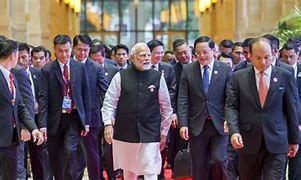Context:
Recently, the Prime Minister of India attended the 19th East Asia Summit (EAS) on 11 October 2024 in Vientiane, Lao PDR.
Key Highlights of the Summit
Indo-Pacific Vision and ASEAN Centrality:
- The Prime Minister stressed ASEAN’s critical role in shaping the Indo-Pacific regional architecture, aligning it with India’s Indo-Pacific Ocean’s Initiative (IPOI) and the ASEAN Outlook on the Indo-Pacific.
- He emphasized the need for a development-based approach rather than an expansionist one to maintain stability and prosperity in the region.
India’s Act East Policy:
- India’s participation in the EAS forms a cornerstone of its Act East Policy, which aims to enhance cooperation with East Asian and Southeast Asian countries.
Global and Regional Peace:
- Highlighting the severe impact of conflicts on the Global South, the Prime Minister emphasized the need for dialogue and diplomacy, guided by a humanitarian approach, as the key to peaceful conflict resolution worldwide.
- Stressing that Indo-Pacific’s peace, security, and stability are crucial for the entire region, he called for adherence to the UN Convention on the Law of the Seas (UNCLOS), ensuring freedom of navigation and airspace.
Security Challenges:
- The Prime Minister underscored the threats posed by terrorism, cybersecurity challenges, and maritime issues, stressing the need for collective action to combat these global challenges.
Myanmar Crisis and Humanitarian Assistance:
- India expressed its support for ASEAN’s Five-Point Consensus (5PC) on Myanmar and reiterated the importance of continuing humanitarian assistance to the country.

About East Asia Summit
- The EAS was established in 2005 as a platform for dialogue on strategic, political, and economic issues of common interest in the Indo-Pacific region.
- The EAS consists of 18 countries, including the 10 ASEAN members (Brunei, Cambodia, Indonesia, Laos, Malaysia, Myanmar, the Philippines, Singapore, Thailand, and Vietnam), along with Australia, China, India, Japan, New Zealand, Republic of Korea, Russia, and the United States.
- Objectives: To promote peace, stability, and prosperity in the East Asian and Indo-Pacific regions through dialogue and cooperation.
Significance for India:
- The EAS is a vital component of India’s Act East Policy, providing a platform to engage with its Asia-Pacific partners on issues of regional importance.
- It enhances India’s engagement with the Indo-Pacific region and supports its broader vision of a free and inclusive Indo-Pacific.

